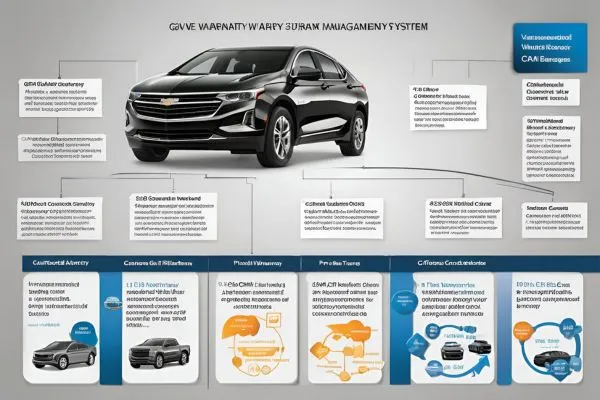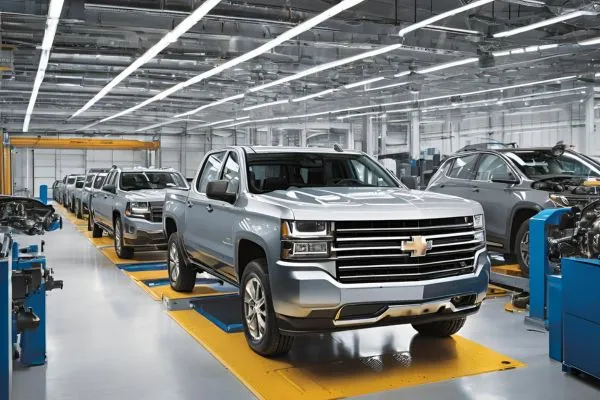What Are the Applicable Warranties in the GM Global Warranty Management System (GMWMS)?

Introduction To Applicable Warranties in the GM Global Warranty Management System (GMWMS)
General Motors, or GM, is a big car company from Detroit, Michigan. They make vehicles like trucks, SUVs, cars, and vans for people all over the world. GM also builds special vehicles like buses and ambulances. GM has been making cars for a long time—since 1901! The founder, William C. Durant, started a small car company in Flint, Michigan, when cars were mostly made in places like England, Germany, and France. Later, in 1914, Durant sold his business to General Motors Corporation, which became the biggest car maker in the world.
Over the years, GM has grown into a super-successful company. Today, it is known as an American car giant, but it also sells cars around the globe. GM mainly focuses on its home market in the United States. It has about 240,000 employees working in 170 facilities across North America. Its main office is in Detroit, Michigan.
GM works under a single set of rules and policies. Every part of the company follows the same guidelines to keep things organized. Their goal is to stay strong in the car industry by making better cars that use less fuel and are good for the environment. GM’s hard work has made it one of the most successful companies ever.
GM Global Warranty Management System
The GM Global Warranty Management System (GMWMS) is a tool that helps manage warranties. A warranty is like a promise from the company to fix certain problems with the car. This system has many helpful features:

- A customer portal lets people track their warranty claims.
- Dealers get email alerts about safety issues or car performance problems, like airbag issues or bad fuel mileage.
- It has tools for managing documents and creating reports.
The system also works with other software like Microsoft Dynamics CRM. This makes it easier for both the company and dealers to stay updated on warranty status, service history, and repairs. GMWMS supports the entire warranty process, from the time a car is sold to when the warranty ends. Dealers can even use the system to audit warranties, check coverage, and handle recalls.
How Does It Work?
GMWMS is like a big computer program that helps with everything about warranties. When a car is sold, two things affect its overall cost:
- How many cars the company makes each year.
- How old the car is when sold.
Manufacturers might add extra charges for things like extended warranties or special features like leather seats or navigation systems. These add-ons make owning a car more expensive over time.

Imagine having all the details of every car sale in one place! This system can find patterns and help dealers save money while making their businesses better. GM uses advanced computer tools like data mining and natural language processing to study huge amounts of data. These tools can make graphs, charts, and reports to show important insights.
Why Is the Warranties Section Important?
Including a warranties section in GM’s system is important for three main reasons:
- Customer Satisfaction: People feel happy and confident when they know their car has a warranty. If something goes wrong, they trust GM will fix it. Happy customers are more likely to stay loyal to GM.
- Marketability: Warranties make cars easier to sell. For example, car dealerships often have long waiting lists for popular models. While customers wait, they research options like extended warranties, which bring in more money for the dealership.
- Reputation Management: A warranty shows that GM believes in the quality of its cars. It gives customers confidence in the product and the dealership. Happy customers are more likely to come back and buy from the same dealer again.
By focusing on customer satisfaction, marketability, and reputation, GM continues to build trust and loyalty with its customers worldwide.

Frequently Asked Questions (FAQs) on What Are the Applicable Warranties in the GM Global Warranty Management System?
Here are some frequently asked questions (FAQs) on What Are the Applicable Warranties in the GM Global Warranty Management System?:
1. What warranties are covered under the GM Global Warranty Management System?
The GM Global Warranty Management System covers various types of warranties, including:
- Basic Warranty: Covers defects in materials or workmanship for a certain period or mileage, whichever comes first.
- Powertrain Warranty: Covers defects related to major powertrain components like the engine, transmission, and drivetrain.
- Corrosion Warranty: Covers rust-through issues on the vehicle body.
- Emission Coverage: Includes coverage for emission-related parts and components.
- Roadside Assistance: Covers emergency services like towing and flat tire assistance.
2. How can I determine which warranty is applicable to my GM vehicle?
You can determine which warranty applies by referring to the vehicle’s owner manual, the GM website, or by contacting a GM dealership. Your vehicle’s warranty coverage typically depends on factors such as the model, year, and whether it is under a new or extended warranty.
3. What is the duration of GM’s basic warranty under the Global Warranty Management System?
GM’s basic warranty typically lasts for 3 years or 36,000 miles (whichever comes first), but this may vary depending on the region and specific vehicle model. Certain models may have extended coverage for specific parts.
4. Are there extended warranties available through GM Global Warranty Management?
Yes, GM offers extended warranty plans through its Global Warranty Management System. These warranties provide coverage beyond the standard terms and can cover additional repairs and services. These warranties must be purchased separately.
5. Does the GM Global Warranty Management System apply to all GM brands?
Yes, the GM Global Warranty Management System applies to all brands under the General Motors umbrella, including Chevrolet, GMC, Buick, and Cadillac. Each brand may have specific terms for warranties, but the system is designed to manage warranties for all these brands under one platform.
6. How does the GM Global Warranty Management System handle warranty claims?
Warranty claims under the GM Global Warranty Management System can be processed at any authorized GM service center. The service center will evaluate the claim, verify if it meets warranty terms, and initiate the necessary repairs or replacements. You can also track your warranty claims through the system’s online interface.
7. Are there any exclusions in the GM Global Warranty Management System?
Yes, some common exclusions in GM warranties include:
- Damage caused by accidents, misuse, or neglect
- Normal wear and tear (e.g., brake pads, wiper blades)
- Modifications or aftermarket parts
- Vehicles used for commercial purposes
- Certain environmental factors such as hail damage
8. Can I transfer my GM warranty if I sell my vehicle?
Yes, GM warranties are often transferable to subsequent owners. This can increase the resale value of your vehicle, but it’s important to check specific terms for each warranty type. The transfer process typically involves notifying GM and completing the necessary documentation.
9. What is the process for warranty repair under the GM Global Warranty Management System?
To get a warranty repair, take your vehicle to an authorized GM service center. The technicians will inspect your vehicle and assess if the issue is covered under the warranty. If the repair is covered, it will be carried out at no cost to you, subject to the terms of the warranty.
10. How can I check the status of my warranty coverage or claim?
You can check the status of your warranty coverage or claims by visiting the official GM website or contacting a GM dealership. Many service centers also offer online portals where you can log in to view your warranty details and claim status.
11. Are parts covered under the GM Global Warranty Management System?
Yes, GM warranties cover parts that are found to be defective due to material or workmanship issues. However, parts that wear out over time, such as tires, batteries, and brake pads, are typically not covered under the basic warranty, though they may be covered under separate warranties.
12. How do I file a warranty claim under the GM Global Warranty Management System?
To file a warranty claim, you must:
- Visit an authorized GM service center.
- Provide proof of warranty coverage (such as your warranty booklet or registration).
- Allow the service center to inspect your vehicle and assess the issue.
- If the claim is accepted, the necessary repairs will be performed under the warranty.
These FAQs can provide a helpful understanding of the GM Global Warranty Management System and its applicable warranties. For more details, it’s always best to consult official GM documentation or a certified GM dealership.
